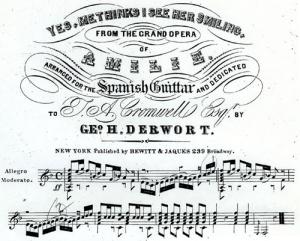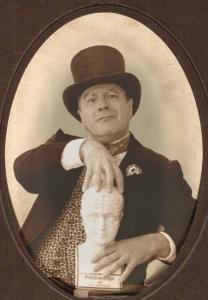Walter's Random Musings
Digital Libraries on a Shoe String
These are the Powerpoint slides from a presentation I gave at the "Internet Librarian" conference on Oct 27th 2009. As with all my Powerpoints, it is really just there to cue me to talk about stuff, and the stuff is not necessarily covered on the slides. However, I hope it might be of some use to those who were not there.
View Slides
Evening Wear
 Gentleman's evening wear changed hardly at all from around 1860 until the turn of the century when the Tuxedo made its gradual march toward respectability.
Gentleman's evening wear changed hardly at all from around 1860 until the turn of the century when the Tuxedo made its gradual march toward respectability.
From about 1860 to the 1920s, proper evening wear was a unvarying uniform of black tail coat, white bow tie, black or white vest (there seems to have been some personal latitude in selecting a vest--black being the most common) and black trousers, with a white, heavily starched shirt. The only thing that changed was the collar, which followed the current fashion.
What to Wear to a "Costume Optional" Vintage Dance
Most of the vintage dance events around here say things like "Historical attire suggested but not required" or "..admired but not required". The problem is, what does it mean to someone who doesn't have the historical costume. Sure, it's not required, but what is?
Renting a Hall for a Vintage Dance
One of the big challenges in putting on a vintage dance event is finding the right hall. Here are a few thoughts on the topic from someone who has been doing it for a few decades.
Conference Presentation on Marketing Your Library
I gave a presentation called "Marketing with Everything You've Got: the interconnectedness of all things" at the latest convention of the users of the Library automation system that my employer uses (the vendor is called SIRSI/Dynix).
The presentation advocates a holistic approach to marketing that first emphasizes good customer service. While the Powerpoint slides lack much of my narrative, they do give a fair outline of my arguments.
The Torturer's Dilemma
There has been much talk lately about torture -- with the defenders asserting that, moral objections aside, it was effective and therefore justified. The "ticking timebomb" is held up as the exemplary scenario. I'm afraid this is illogical, given the ultimate dynamic of torture.
Museum Photographic Collections on Flickr
It looks like venerable institutions like the Smithsonian and Eastman collection are putting their photo archives up on Flickr. I haven't been able to find a proper "portal" that links to all of them, but here's what I have found:
Nationaal Archief Netherlands
Some Techno Thoughts on Getting the Word Out
In my job as a corporate web guy, and in my capacity as a compulsive organizer of events, I have had a lot of cause to ponder the use of technology to promote what ever it is I am involved in. Here are a few random thoughts for others in the same boat.
The Living History "Flash Mob"
Lately I have been pondering the situation of the "civilian re-enactor". This is someone who chooses to portray a non-military person at public history events. This civilian often finds him or herself marginalized at events that are really all about soldiers marching about and playing "bang you're dead" or gunfighters doing what ever gunfighters do, as well as also target shooting or playing "bang you're dead".
Further, the civilian is often, by choice and situation a free agent without the support provided by an established group. This can be very isolating, and seriously degrade one's quotient of fun, with nothing much to do and no one to talk to.
Modern technology however offers an interesting opportunity to mitigate the negative aspects of wanting to portray the ordinary man, woman or child of the era while increasing the fun and impact of our activities.
A modern phenomenon is the "flash mob", where a group of individuals use email, texting, social networks, cell phones and the like to create collective action. Often it's things like political protests or stunts. However, this same model of the flash mob can be applied to our hobby, and allow the benefits of a supportive group of like minded people without the complexity and constraint of formal organizations.
I would like to suggest that we who portray historical folk embrace the model of the "flash mob" and use technology to make our mark on the world.
Some Sources for Historical Sheet Music
 In the business of putting on historical events with appropriate music, one frequently encounters the need to find appropriate sheet music. Further, when one has been doing historical events for many years, one can get a bit tired of the same tunes all the time, and want to dig up something new--which is to say something that everyone hasn't heard yet.
In the business of putting on historical events with appropriate music, one frequently encounters the need to find appropriate sheet music. Further, when one has been doing historical events for many years, one can get a bit tired of the same tunes all the time, and want to dig up something new--which is to say something that everyone hasn't heard yet.
Fortunately, there seems to be a growing collection of sites on the web that can be tapped for historical sheet music. Of course, with copyright laws being what they are, you aren't going to find much past 1925, but if your interests lie in the Victorian or Ragtime eras (and occasionally earlier) there's some good stuff out there free of charge.
Here are the ones I know about. If you know some more, please add them via "comments".



